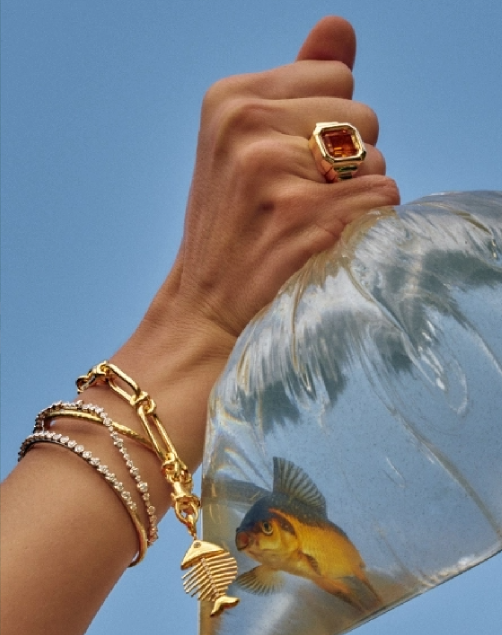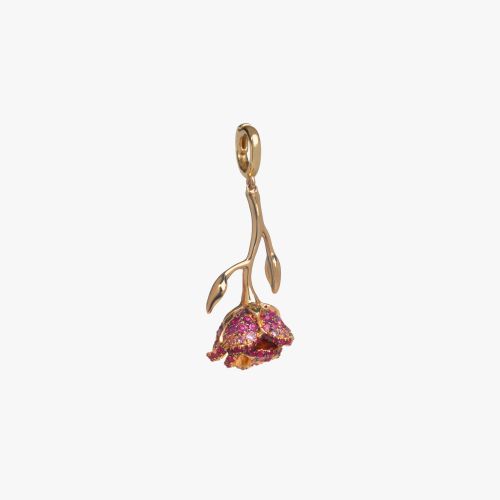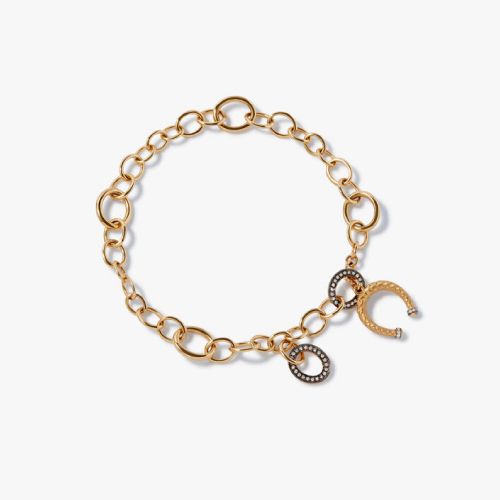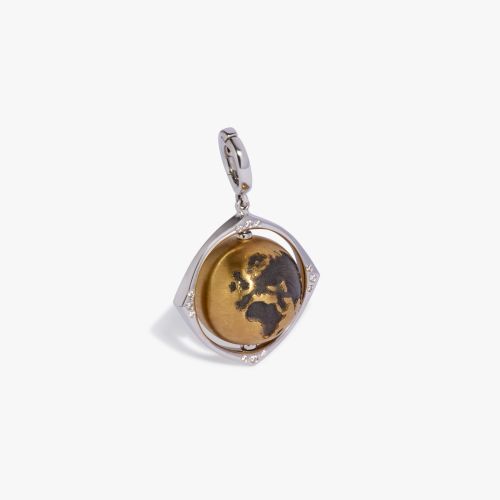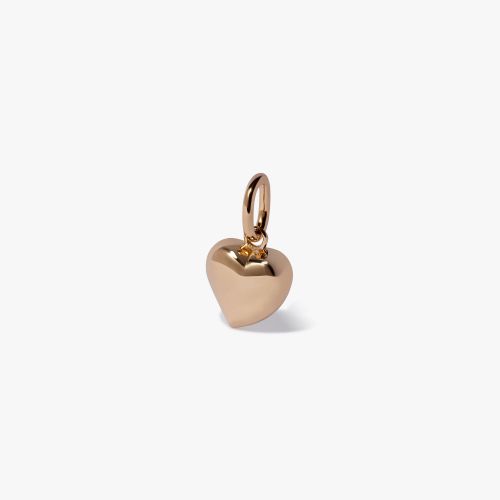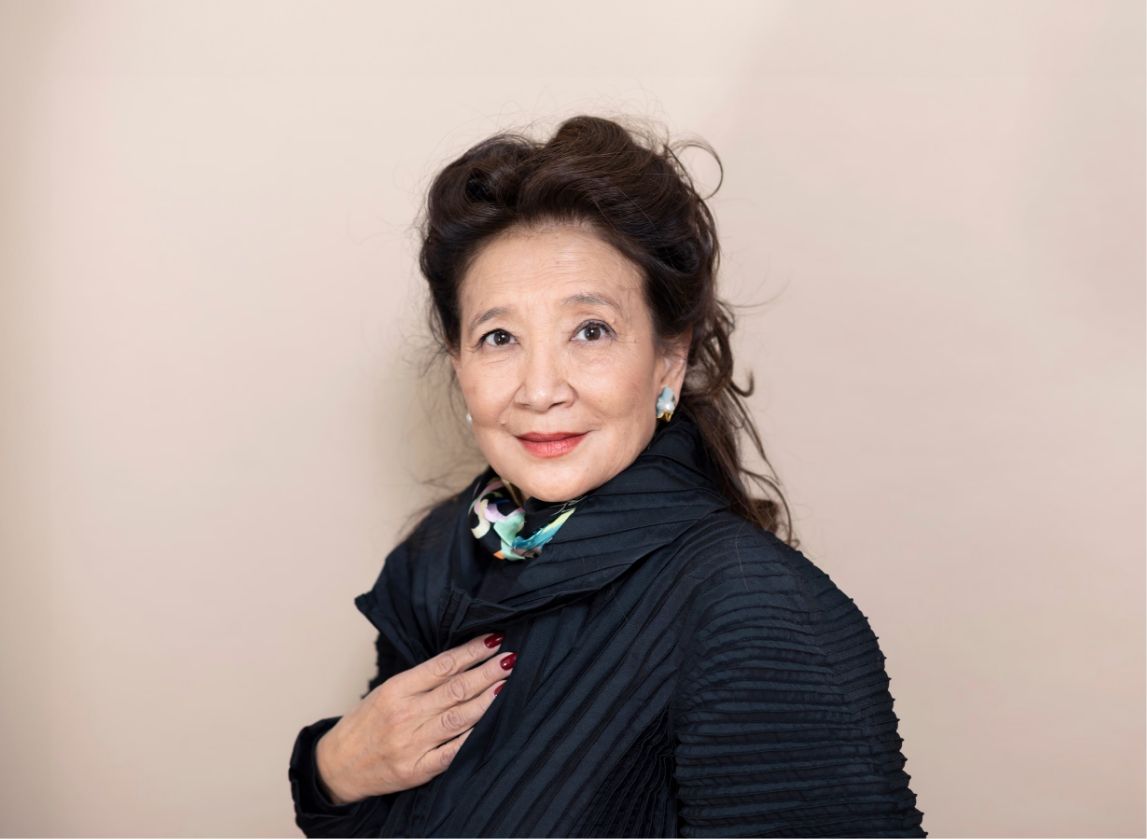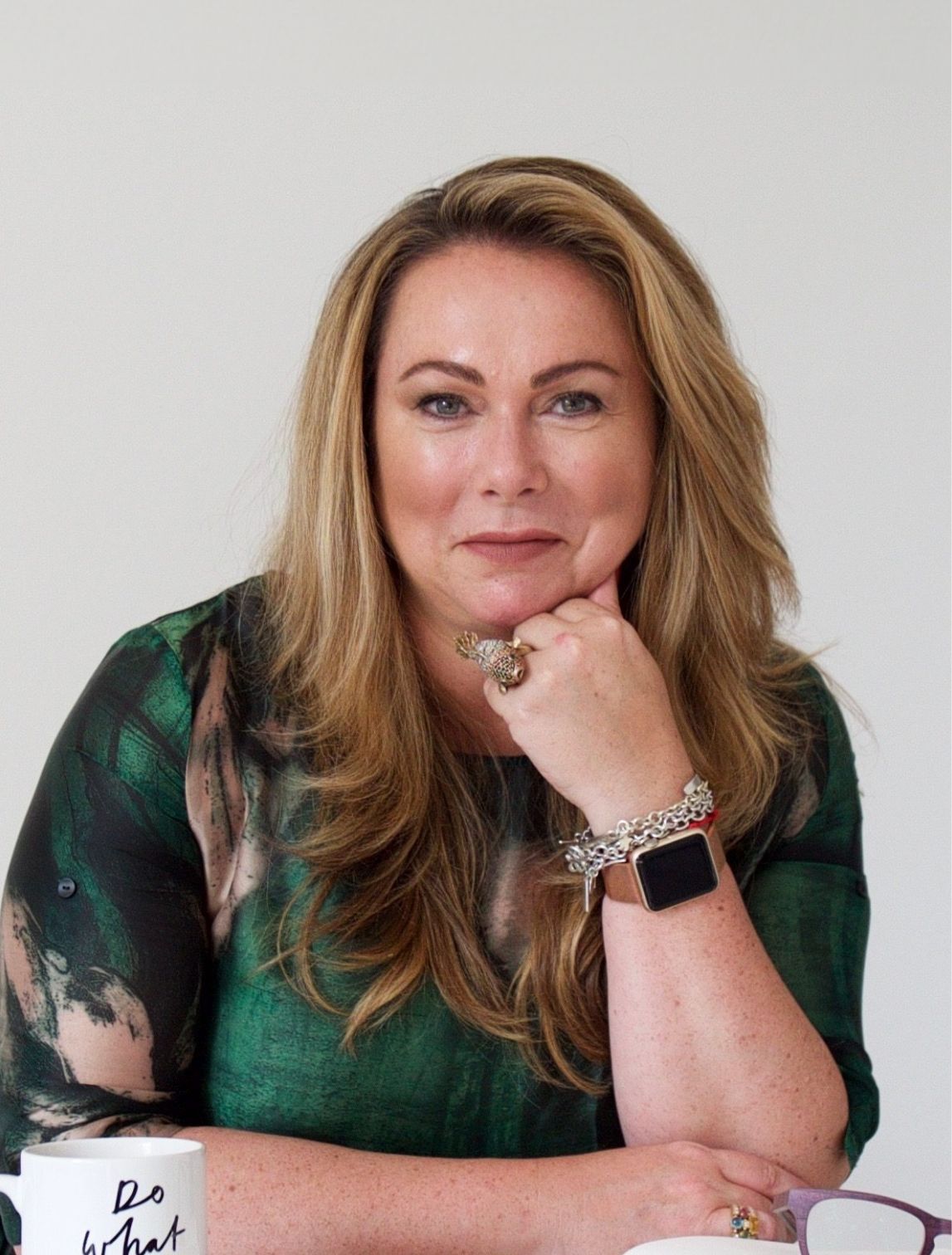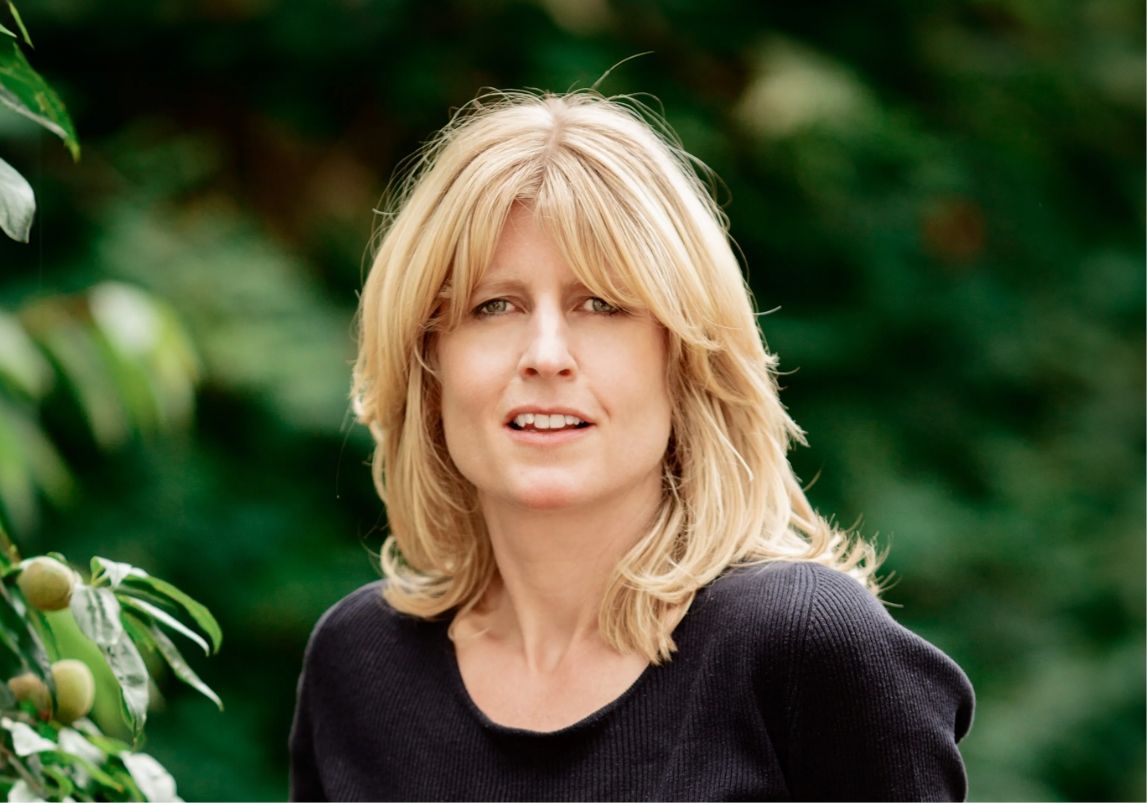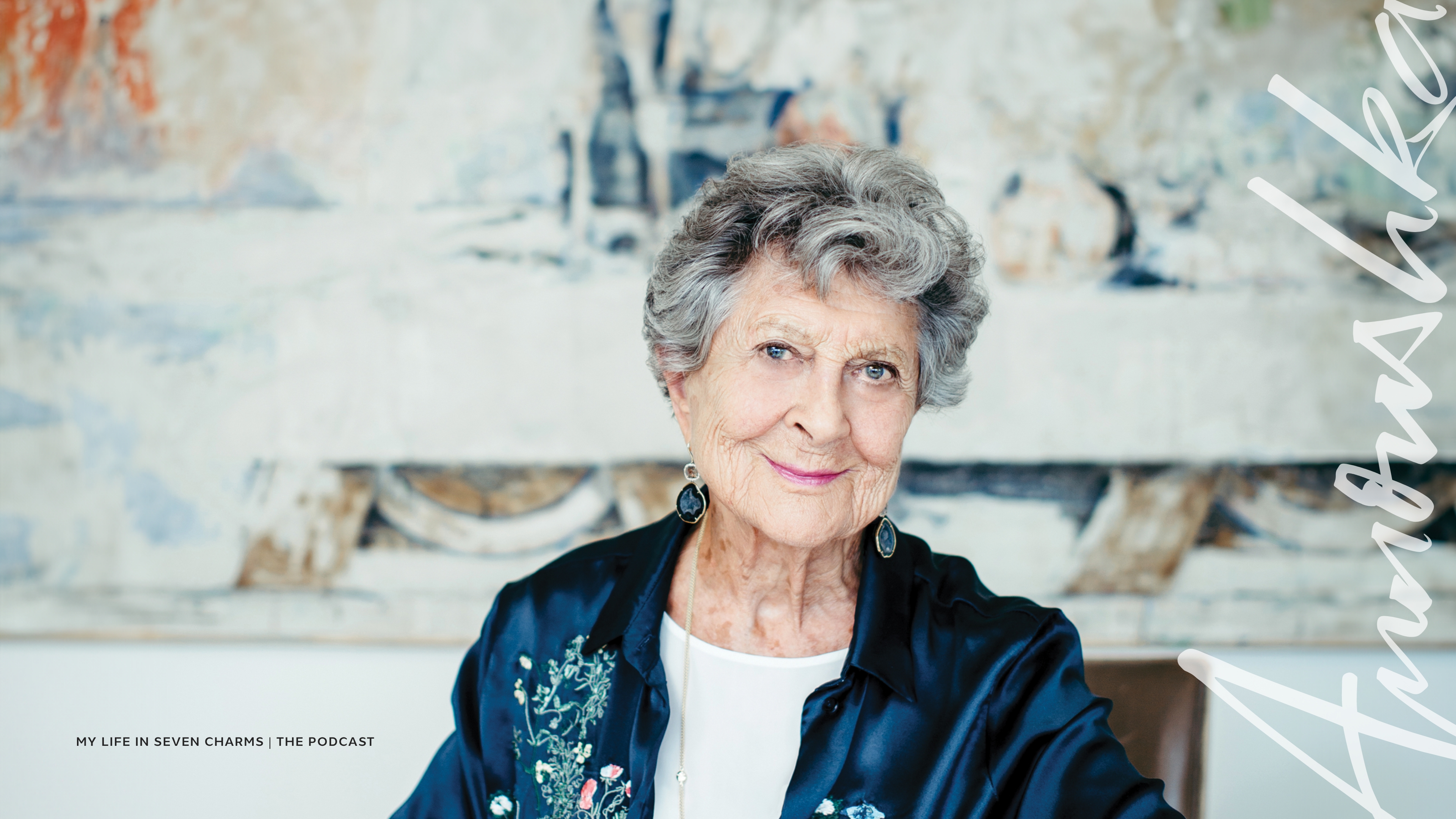
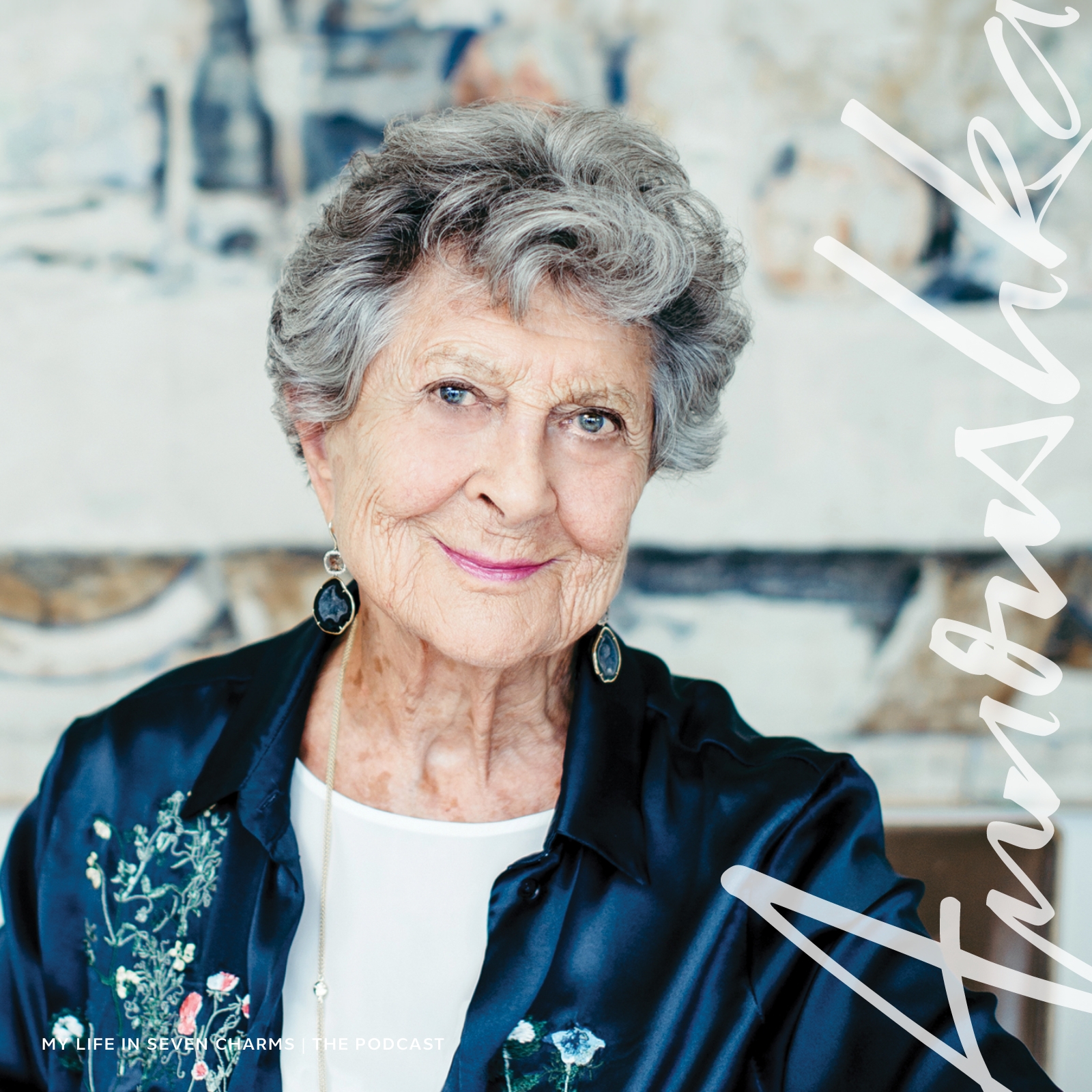
READ THE PODCAST
Annoushka Ducas:
I'm Annoushka Ducas. Welcome back to My Life in Seven Charms. For me, there are so few things which can evoke a memory like a tiny, detailed
In this new series, I'll be meeting seven extraordinary women and hearing their stories through this very special 18-karat gold biography. In this episode, we're hearing the incredible story of fashion's grande dame, Mrs. B.
Mrs. B.:
It's an instinct. That's all. It's a feeling. It's a feeling. I don't know, but I'll take bets on it. I will say this for Browns: it did become the window of the world for buyers of other countries to see. If they saw it in Browns, they knew they had a winner.
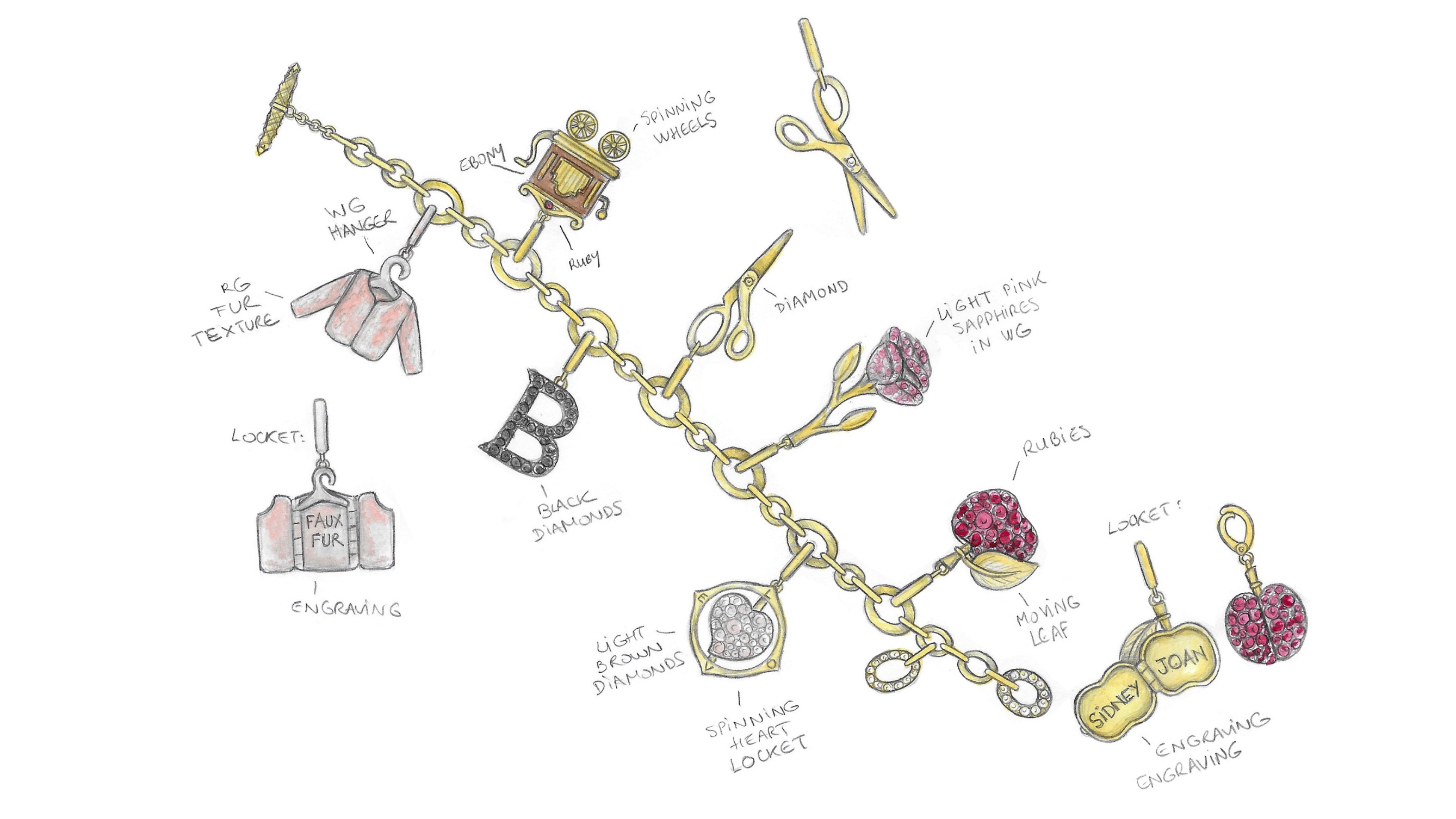
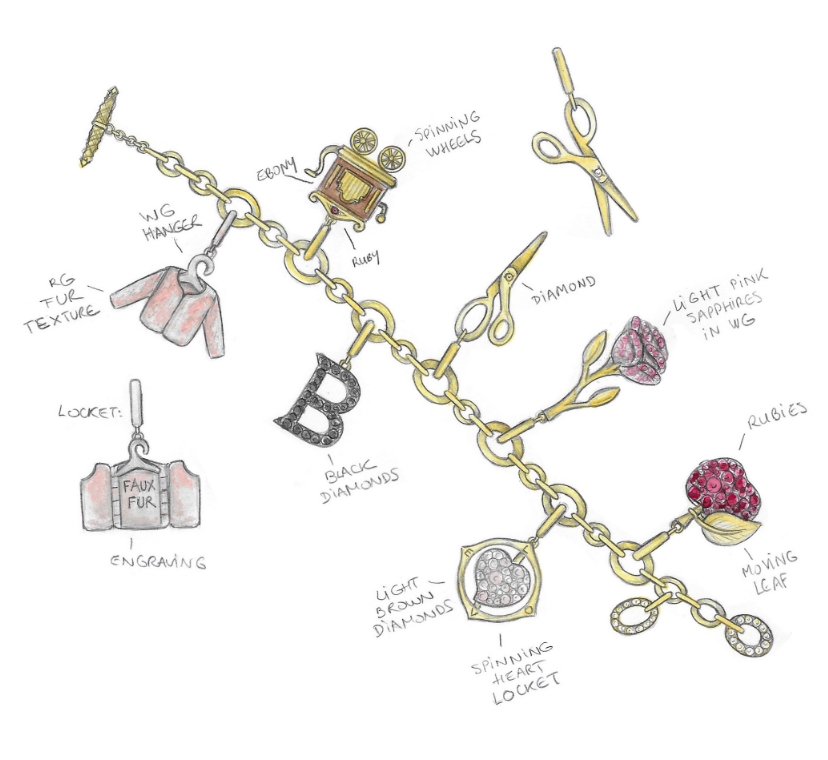
Annoushka Ducas:
Welcome back. Today, I'm meeting the legendary Mrs. B. She is the original curator, the first and foremost fashion retailer whose unerring eye has left an indelible mark on the way we look. Mrs. B. has seen it all. From the Blitz in London to today's pandemic, she has a panoramic view of the many decades that shape the world and the way we live in it. Founder of multi-brand emporium Browns, the persuader who was able to entice luxe brands to London, making names with John Galliano, Alexander McQueen and many, many others. I'm incredibly privileged to be here today in Hampstead to meet the iconic Joan Bernstein, CBE, to hear all about her Life in Seven Charms.
I was trying to work out when I very first met you. I think it was certainly longer than five years. I can't remember exactly-
Mrs. B.:
Yes. Well, we were at a lunch, weren't we?
Annoushka Ducas:
That's right. I was saying to my husband last night.I was saying, "I remember meeting Mrs. B. and she asked me, did I shop at Browns?"
Mrs. B.:
Oh, yes.
Annoushka Ducas:
I remember being rather embarrassed and saying, "No I didn't shop at Browns." You were horrified. You said, "Why don't you shop at Browns? Of course, you should." I remember saying, "Because I think it's a bit scary."
Mrs. B.:
Yes, that's right.
Annoushka Ducas:
Do you remember?
Mrs. B.:
Yes, I do remember. Then I introduced you to Nada.
Annoushka Ducas:
You absolutely did.
Mrs. B.:
Yes.
Annoushka Ducas:
But you were very persistent. You must have rung me about three times: "Now, now look, are you coming in?"
Mrs. B.:
Well, I told Nada about you. I said, "This is a most elegant woman and she should be dressed by Browns. We've got everything for her." She's still with us, still with Browns.
Annoushka Ducas:
Oh, she is?
Mrs. B.:
I'm going to visit Browns for the first time tomorrow.
Annoushka Ducas:
Oh my goodness. Now, how are you feeling about that?
Mrs. B.:
Okay.
Annoushka Ducas:
Are you?
Mrs. B.:
I've had to let it go.
Annoushka Ducas:
Yes.
Mrs. B.:
I'm not really a part of it anymore, that which I created.
Annoushka Ducas:
I know. Do you feel, are you nervous about going in?
Mrs. B.:
I'll let you know after tomorrow.
Annoushka Ducas:
Okay, you let me know.
Mrs. B.:
I'm going in with the new CEO and with my son and daughter.
Annoushka Ducas:
Okay, so you've got good support.
Mrs. B.:
Full of armor.
Annoushka Ducas:
Yeah, no, good support.
Mrs. B.:
I've heard good things about it.
Annoushka Ducas:
Well, good. I hope that goes well.
Mrs. B.:
Yes. I'm very grateful for Farfetch, actually.
Annoushka Ducas:
Well, yeah. That's a whole other... Could you ever imagine that Browns would be...
Mrs. B.:
No.
Annoushka Ducas:
[inaudible 00:03:22]?
Mrs. B.:
No.
Annoushka Ducas:
Oh, my God.
Mrs. B.:
I don't think anybody could imagine the future that we're living in. Do you?
Annoushka Ducas:
No.
Mrs. B.:
Or at least young people could.
Annoushka Ducas:
Well, I'm not even sure young people could. I mean, it is extraordinary.
Mrs. B.:
It is an extraordinary time, really.
Annoushka Ducas:
It really is. Right. Thank you so much for doing this. I feel really, really honored and privileged to hear about your story and your life in seven charms. It must've been quite difficult to work out what they were going to be.
Mrs. B.:
Well, let me say one thing. I truly am very honored that you asked me to do this podcast. I really am.
Annoushka Ducas:
Oh, thank you.
Mrs. B.:
I thought when I was told first of all, "But why me? My store is so ordinary in comparison to the wonderful women that I've listened to that you've talked to."
Annoushka Ducas:
There's nothing ordinary about you or your story. I'm going to just talk about your very first
which I absolutely love this idea. Because when I first imagined the charm, I imagined something quite different to actually how it was.
This is, I've drawn it as a miniature, faux fur coat which is what you said it should be. You were very specific. You said it needed to be pale pink, straight, short, collarless and unbuttoned.
Mrs. B.:
Absolutely.
Annoushka Ducas:
I'm thinking, That's a bolero type style, is that right?
Mrs. B.:
It could have been.
Annoushka Ducas:
It could be. The way I've seen it, it's quite difficult to imagine this in a piece of jewellery. But I have seen it probably in
just because it was pink. Quite textured, so we get the feeling of the fur. I'd like it to have your name inside it, but I wasn't sure how you'd feel about that. I'm absolutely intrigued. A pink faux fur coat. It seems incredibly fashion forward. What year are we talking about?
Mrs. B.:
Well, that was when I was... I must've been 16, I think. Yes, yes. That was many years ago, wasn't it?
Annoushka Ducas:
That was a long time ago.
Mrs. B.:
My mother worked for my uncle, who was a tailor, in the East End. They were making these lovely little coats, and so she thought I should have one. That's how I got it.
Annoushka Ducas:
Did you wear it every day?
Mrs. B.:
I wore it all the time. Not every day, but I wore it on weekends always.
Annoushka Ducas:
Tell me more about your mother and your relationship with your mother.
Mrs. B.:
My relationship with my mother was wonderful. She nearly died when I was born. Yes, I was an incubator baby, because she had a heart problem.
Annoushka Ducas:
Oh my goodness.
Mrs. B.:
She didn't live a very full life, and she was always, always ill. So I was always with her. I adored her and she adored me.
Annoushka Ducas:
Were you the only one?
Mrs. B.:
No, I have another sister but she was older. We had eight years difference. That eight years made a lot of difference.
Annoushka Ducas:
And your father, where was your father?
Mrs. B.:
My father was a chiropodist. Yes.
Annoushka Ducas:
And working in...?
Mrs. B.:
Well, originally he actually was a barber on ships when I was young.
Annoushka Ducas:
So he was always-
Mrs. B.:
I didn't use to see him very much, but he used to come home and bring me beautiful presents. That I do remember.
Annoushka Ducas:
What kind of presents?
Mrs. B.:
He went to Jamaica and bought me these wonderful dolls. They were wonderful. A boy and a girl. I treasured them. And he would bring back tortoise shells, covers.
Annoushka Ducas:
Beautiful.
Mrs. B.:
He had a great eye, my father did. He did.
Annoushka Ducas:
So maybe-
Mrs. B.:
And then he gave that up and became a chiropodist. He studied chiropody because he felt that was a stage higher than being a barber, which it was. And then we moved to go to Golders Green and he set up his surgery in the house that we lived in.
Annoushka Ducas:
So he no longer went to sea at that point?
Mrs. B.:
No. No, no.
Annoushka Ducas:
But your memory is mainly spending it with your mother?
Mrs. B.:
Yes.
Annoushka Ducas:
Spending your childhood with your mother.
Mrs. B.:
Oh, yes. Yes. I left school, when I think I about it, my school closed when all-
Annoushka Ducas:
Because of the war.
Mrs. B.:
Yes. And when all the other schools usually went out, they had other locations. They didn't. The situation was, my mother wanted me protected. She didn't want me to go into a factory because they were recruiting girls to go into factories.
My uncle was a scientist and he had a very good friend who had a chemist shop in Kings Cross. He got me in there apprenticed.
Annoushka Ducas:
Apprenticed as a pharmacist?
Mrs. B.:
Apprenticed, yes. Well, it was just to give me a job and to keep me out of going to a factory. That's how I learned about life, actually.
Annoushka Ducas:
I mean, you must've been incredibly unusual to have been doing that.
Mrs. B.:
I suppose so. I was quite a bright girl. That I do know. I won a scholarship to the Henrietta Barnett School, which was wonderful because it also, that scholarship paid her my uniforms which we couldn't afford. Just couldn't afford to buy. But my scholarship included that.
Annoushka Ducas:
So you have a full scholarship.
Mrs. B.:
I must've been quite clever.
Annoushka Ducas:
You obviously were. You obviously are.
Mrs. B.:
No, I think I went to a very good primary school, Burley Road, in Tufnell Park.
Annoushka Ducas:
Do you have happy memories of primary and school?
Mrs. B.:
Yes, I do.
Annoushka Ducas:
You do?
Mrs. B.:
The happiest memory I have of Burley Road, is I used to be given a ha'penny every day to go and buy little chocolate buttons from the tuck shop outside the school.
Annoushka Ducas:
It's so funny, the things we remember.
Mrs. B.:
Isn't is odd the things you remember? I must have been so young, but I remember they were given to me in newspaper.
Annoushka Ducas:
Gosh.
Mrs. B.:
In a little cone, and I would walk up Cathcart Hill to where we lived. Oh, but those ha-pennies worth of chocolate buttons meant everything to me.
Annoushka Ducas:
Helped you get back up the hill.
Mrs. B.:
I think it did. Yeah.
Annoushka Ducas:
Maybe we should go back to presenting things in newspaper again.
Mrs. B.:
I wouldn't be a bad idea.
Annoushka Ducas:
[crosstalk 00:10:06], really wouldn't be a bad idea.
Mrs. B.:
Sustainable.
Annoushka Ducas:
I know. So was your mother working as well, but she was not very well?
Mrs. B.:
Oh, yes. She was a seamstress working for my uncle, who was a tailor. All my family were in the fashion business, really, I suppose, because my two aunts were dressmakers.
Annoushka Ducas:
My goodness, well that actually comes onto your next charm.
Mrs. B.:
Next, exactly.
Annoushka Ducas:
Absolutely.
Mrs. B.:
Yes.
Annoushka Ducas:
But before we go onto your next charm, I guess at that age, because you said your mother didn't want you to go to the factories, so you were really living in London through the Blitz?
Mrs. B.:
Oh, yes. Yes, yes.
Annoushka Ducas:
So my goodness, what was that like.
Mrs. B.:
In fact, the house that we lived in, it was the Air Raid Warden's post, felt quite safe in there.
Annoushka Ducas:
You felt very safe there.
Mrs. B.:
[crosstalk 00:10:59] it was quite [crosstalk 00:10:59].
Annoushka Ducas:
Was there a shelter underneath?
Mrs. B.:
No, no. No shelter. Our lounge was the shelter.
Annoushka Ducas: Do you remember being terrified? Were you frightened?
Mrs. B.:
Do you know I wasn't? Wasn't. Must have been an idiot, but I wasn't. I wasn't, the only time I was frightened was when we were alerted by... We lived next to a block of flats. One of my friends' son's saw an incendiary bomb had been thrown into the garden, or dropped into the garden, not thrown. Dropped into the garden. And he saw flames and alerted us and all the family went out and put it out. That's the only time. Otherwise, I must have been an imbecile. I wasn't frightened.
Annoushka Ducas:
Or it was just life? Or was that just...?
Mrs. B.:
I don't know. I thought it was part of living, I think.
Annoushka Ducas:
But going back to your second
which is a pair of scissors.
Mrs. B.:
Yes.
Annoushka Ducas:
And you were very specific that these scissors had to have very long blades.
Mrs. B.:
Oh, yes. Because, that's how I recall them. That's another thing, it's amazing how I can recall. I can see myself sitting on the cutting table whilst my aunts were doing their sewing on the machines and everything and cutting, and I would look through the magazines, flipping through the magazines that they had there, which I disliked entirely because they were, at that time, the magazines showed women, all long and thin and wearing very funny sort of dresses, I thought.
And I would sit there dangling my legs, and I always remember the cutting scissors on the table.
Annoushka Ducas:
So between your aunts and your mother, you were very much an all women kind of little group.
Mrs. B.:
Yeah, we were. And my aunts were very close to me. They were wonderful. They used to make all my clothes for me.
Annoushka Ducas:
So were you directing what clothes?
Mrs. B.:
Oh, yes I did. I wanted a dress like Shirley Temple. So they made it. Oh, yes. Ooh, yes, yes, yes. I'd cut out of the magazines-
Annoushka Ducas:
Of what you wanted?
Mrs. B.:
Mm-hmm (affirmative). Because when I worked at the chemist, it was marvelous. I had a great arrangement with the newspaper shop in the actual railway station. There was a young man there who liked Brylcreem. So I would save him Brylcreem and he would save me The Ladies' Home Journal, which was an American magazine. And I used to love that magazine.
It really did form, I think, my taste. Because, I wanted always something better than I had.
Annoushka Ducas:
Right.
Mrs. B.:
And America was advanced, very advanced.
Annoushka Ducas:
Advanced in fashion? Was it already there?
Mrs. B.:
Well, they were. Yes, because they were guided by the film stars.
Annoushka Ducas:
That's so interesting because I always imagined that Paris was-
Mrs. B.:
No, this was before Paris.
Annoushka Ducas:
Before Paris, okay.
Mrs. B.:
Paris was too sophisticated for me. I don't think I knew about Paris then. I just knew about the Shirley Temple dresses and the Gone With the Wind dresses.
Annoushka Ducas:
Oh, my goodness.
Mrs. B.:
Oh, they were wonderful. Vivien Leigh and the Gone With the Wind dresses, ah.
Annoushka Ducas:
So describe that first dress that they made for you.
Mrs. B.:
Well, I think it was the one that had a very tight bodice and it was in printed cotton and a very, very full skirt. That was my Gone With the Wind dress.
Annoushka Ducas:
Oh God, how beautiful.
Mrs. B.:
It was beautiful, beautiful.
Annoushka Ducas:
You couldn't wear that to the pharmacy.
Mrs. B.:
No, it didn't. Oh no, don't be silly. I was given a white coat to cover everything up.
Annoushka Ducas:
But just going back to your aunts, they were, as you said, seamstresses. And who were they making for?
Mrs. B.:
Well, they had a very elite clientele. They called themselves court dressmakers, because it elevated them. They had a salon in the front of the shop, where the customers waited, were fitted. And then the workroom was the back. And my grandma used to live upstairs.
Annoushka Ducas:
Do you remember amazing people coming?
Mrs. B.:
I do remember the Sitwells.
Annoushka Ducas:
Oh, my goodness.
Mrs. B.:
They were clients. I don't know if it was Edith that gave me the barrel organ, but I know it came from a Sitwell, as well, my aunts always told me.
Annoushka Ducas:
So this hugely strong fashion sense, it must have started-
Mrs. B.:
It must have been, yes.
Annoushka Ducas:
It must have started from there.
Mrs. B.:
Yes. I was always very aware of what I wanted to wear and how I wore it.
Annoushka Ducas:
And were they all rather lovely and glamorous, your aunts and your mother?
Mrs. B.:
No, they didn't have time for glamour.
Annoushka Ducas:
So they were just making everyone else glamorous.
Mrs. B.:
They were lovely people, hearts of gold.
Annoushka Ducas:
I'm fascinated by this third
You've mentioned it, but it's the barrel organ.
Mrs. B.:
Hmm.
Annoushka Ducas:
Well, I've drawn it.
Mrs. B.:
Yes.
Annoushka Ducas:
But I could be very wrong in the way I've drawn it.
Mrs. B.:
No, no. You're not very wrong. You even put the two disks that went into the barrel organ at the top and I would wind... It had a handle.
Annoushka Ducas:
The handle, yes.
Mrs. B.:
And it was marvelous. It was lovely. And that as I say, I'm sure, was the gift from the Sitwells.
Annoushka Ducas:
From the Sitwells?
Mrs. B.:
Yes. That's what my aunts told me anyway.
Annoushka Ducas:
I mean I've obviously drawn it tiny. I've drawn it so it's
and three-dimensional.
Mrs. B.:
It's amazing.
Annoushka Ducas:
And on its wheels, so that it could be moved about and transported.
Mrs. B.:
Yes, it was moved around.
Annoushka Ducas:
So the wheels will definitely go round, and the handle will go round.
Mrs. B.:
Yes, you've got it all there.
Annoushka Ducas:
I've housed it in wood, actually, so that that the actual barrel inside with the little teeth, because that's what made it go.
Mrs. B.:
Do you know, I think it was metal.
Annoushka Ducas:
Oh, was it? The whole thing?
Mrs. B.:
I think it was all metal, yes.
Annoushka Ducas:
And what colour was it, do you remember?
Mrs. B.:
No, it was a mixture of colours. I remember seeing a mixture of colours, so what could it have been?
Annoushka Ducas:
Well, I don't know-
Mrs. B.:
It could have even been painted.
Annoushka Ducas:
It could have been very fancy.
Mrs. B.:
Yes, it could have been painted.
Annoushka Ducas:
Do you know what happened to it?
Mrs. B.:
I don't know what happened to it. That's the awful thing. I really don't know.
Annoushka Ducas:
But it's such an important-
Mrs. B.:
Isn't that awful? It was very important yes, because I'd never seen anything like it, and to hear... I wish I could remember the tunes, but the music, it was lovely. It was like a fairground.
Annoushka Ducas:
Oh, of course.
Mrs. B.:
That's what it was.
Annoushka Ducas:
Do you think that had some real influence on your life and the way you talk about-
Mrs. B.:
I think because it was different. I've always wanted something that's different. I think that's my problem.
Annoushka Ducas:
Well, you certainly found lots and lots of things.
Mrs. B.:
Oh, well.
Annoushka Ducas:
Different. I wouldn't describe that as a problem. You're just [crosstalk 00:18:10]-
Mrs. B.:
My husband would. My late husband would have done.
Annoushka Ducas:
He'd describe it as a problem?
Mrs. B.:
Yeah.
Annoushka Ducas:
Well, we're going to come on to talk about your husband. You said, "I want this next
to be an apple." So I've imagined this as a red apple, with little Pavé ruby stones around it.
Mrs. B.:
How beautiful.
Annoushka Ducas:
And it's a
so it opens in two halves, because you're going to tell me why, about this apple. But I thought it should open in two halves, and I thought it could have Joan written on one side and Sydney on the other side.
Mrs. B.:
How beautiful.
Annoushka Ducas:
It would be absolutely...
Mrs. B.:
How beautiful.
Annoushka Ducas:
But do tell me why an apple, and why was this all about Sydney?
Mrs. B.:
Well, I met Sydney, I was invited to a birthday party. And I was with a boyfriend. And I was at the birthday party and it was a lovely, lovely party, I must say. They had cakes and chocolate eclairs and things like that, that you couldn't get at that time.
Annoushka Ducas:
Delicious.
Mrs. B.:
And I went to take a chocolate éclair and this hand went, "You don't need that."
Annoushka Ducas:
Oh, my goodness.
Mrs. B.:
And I looked around and there's this man I've never met. And I said, "Why?" And he said, "Because you're plump enough."
Annoushka Ducas:
He did not.
Mrs. B.:
He did.
Annoushka Ducas:
And you married him?
Mrs. B.:
Yes.
Annoushka Ducas:
Go on.
Mrs. B.:
Well, after that I thought, "Wow, I must know more about this man who can say something like that and make me think."
Annoushka Ducas:
And were you plump?
Mrs. B.:
And it did make me think. Yes I was plump. Yes.
Annoushka Ducas:
Oh, you were.
Mrs. B.:
I wasn't plump, plump. But I was plump.
Annoushka Ducas:
Plump enough for him to think-
Mrs. B.:
Yes, of course, obviously.
Annoushka Ducas:
Oh, God. You've got to tell me [crosstalk 00:20:03]-
Mrs. B.:
Well, he was a gymnast, you see.
Annoushka Ducas:
Ah.
Mrs. B.:
So he was very keen on exercise. And I did. I used to play netball and hockey. But he was a real gymnast. Anyway, he asked me out you see, and I was still working in the chemist. And we arranged, I'd meet him, I think it was Leicester Square Station or something and I met him there. And I was a few minutes late, and he said, "Hmm, I wasn't going to wait any longer if he hadn't come run..." He said, "You've just made it. I wasn't going to wait any longer."
I said, "I'm so sorry, but I was at work and I had to wait..." Anyway, we went into the cinema and he produces from his pocket, an apple. And he broke in half just like that.
Annoushka Ducas:
You're gesticulating with your hands.
Mrs. B.:
Yes, just like... And passed me the other half. Well, I thought, "This is odd. But okay I'll eat it." It was a Cox's Orange Pippin, remember that and they were very difficult to come by.
Annoushka Ducas:
Because what year are we?
Mrs. B.:
So it was really a real gift.
Annoushka Ducas:
So we're in the middle of the war, here? Are we?
Mrs. B.:
Yes, of course. The middle of the war. That's another thing I did. I was very lucky as well. He didn't realize, but I got all my fruit from the fruit monger in Kings Cross in the station, because they also wanted something from the chemist that they couldn't get and I would keep for them. So I really would get all the fruit I wanted. But I didn't tell him that.
Annoushka Ducas:
Oh, you didn't tell him that.
Mrs. B.:
No, no.
Annoushka Ducas:
No, quite right.
Mrs. B.:
Heaven forbid.
Annoushka Ducas:
Of course, that's so romantic. So he gave you this and that was instead of what we would-
Mrs. B.: And I enjoyed it actually.
Annoushka Ducas:
You did?
Mrs. B.:
I enjoyed it, yes.
Annoushka Ducas:
And then what happened?
Mrs. B.:
Then I was hooked. I wanted to know more about this man.
Annoushka Ducas:
And what was he doing at the time?
Mrs. B.:
He had a Stall in Ridley Road.
Annoushka Ducas:
Right.
Mrs. B.:
It was an outside stall.
Annoushka Ducas:
So Ridley Road is at the east-
Mrs. B.:
[crosstalk 00:22:07] was a market, yes, yes. And I remember that very vividly because I'd never seen... I hadn't been down a market as such, and it was a real market stall.
Annoushka Ducas:
So tell me, because just trying to visualize this market. I love markets, so...
Mrs. B.:
Well, it was a stall outside and he sold underwear.
Annoushka Ducas:
Right, ladies underwear.
Mrs. B.:
Ladies underwear, yes.
Annoushka Ducas:
I'm just trying to get my head around that this is-
Mrs. B.:
Yes, he had contacts.
Annoushka Ducas:
He was a gymnast-
Mrs. B.:
Yes, I know.
Annoushka Ducas:
On one hand, and on the other hand, he's selling ladies underwear.
Mrs. B.:
Yes, oh yes. It was all right.
Annoushka Ducas:
It's not obvious.
Mrs. B.:
He liked women.
Annoushka Ducas:
Yeah, go on.
Mrs. B.:
What happened, he was very lucky. He should have gone into the forces. His brother was a fireman and his other brother was in the forces, but he had an accident about two weeks before war broke out and he was in a coma.
Annoushka Ducas:
Sydney was in a coma.
Mrs. B.:
Yes, he was. And his father game to see him and his father said, "Stay still. Don't move. Otherwise they're going to get you in the Army."
Annoushka Ducas:
Oh, my God. It's given me goosebumps.
Mrs. B.:
I know. And his father reckoned two of this sons were already in the forces and he didn't want to lose a third one. And so when he got better, he had to earn a living, so that's what he did. But I reckon it always affected him, actually. All his idiosyncrasies.
Annoushka Ducas:
And did he ever tell you why he decided it was going to be ladies underwear?
Mrs. B.:
No. Oh, it's because he had contacts. You couldn't get merchandise then. And he had friends. Friends who liked him and one of his friends had an underwear factory and that was amazing. Otherwise, he wouldn't have earned a living.
Annoushka Ducas:
So there he was selling underwear. And he asked you to come down and see his stall?
Mrs. B.:
Yes. So I looked at it and I thought, "Mm-hmm (affirmative)." Annoushka Ducas:
Mm-hmm (affirmative).
Mrs. B.:
Mm-hmm (affirmative).
Annoushka Ducas: Okay, and then-
Mrs. B.:
And then he said, "I don't intend to just have a stall."
Annoushka Ducas:
Right.
Mrs. B.:
He and his brother and they opened a shop in Kingston Market and that's when I went to work with Sydney.
Annoushka Ducas:
Now, were you married by then?
Mrs. B.:
Were we married by then? Let me think.
Annoushka Ducas:
I really want to know how he asked you to marry him. I'm desperate to know that.
Mrs. B.:
I know. How long I've been married.
Annoushka Ducas:
Well, first of all how long were you married?
Mrs. B.:
Oh, that's all right, 63 years.
Annoushka Ducas:
Oh, my goodness.
Mrs. B.:
A long time.
Annoushka Ducas:
What a wonderful, wonderful achievement.
Mrs. B.:
Yes, it was. It was wonderful, too, because he was a very clever man. Once he saw that I was a good buyer, he gave me space. He allowed me to travel. He didn't like traveling.
Annoushka Ducas:
Right.
Mrs. B.:
So I was very, very lucky, really.
Annoushka Ducas:
It sounds like you were both very lucky. Now, am I right in thinking that Sydney saved your life one evening?
Mrs. B.:
Oh, God. He did. He was, as I said, a remarkable man. He had an intuition that was unbelievable. For example, we used to go to [Scott's 00:25:28] every Wednesday evening because it was my staff's night off, so we would go there and I loved eating in the oyster bar, because the restaurant was a bit... you know. And I'm walking ahead of him and I'm going into the oyster bar, and He said, "No, we're not going to the oyster bar tonight. I've booked at the restaurant."
And I said, I didn't want to make a fuss but I muttered to Sydney, "Sydney, you know I don't like the restaurant, and we always eat in the oyster bar." And he said, "We're eating in the restaurant tonight." So, of course, I sailed forth and we sat down. Anyway, as we're sitting there, there is a mighty flash that came through the doors, and it exploded. A bomb had been thrown through the window of the oyster bar.
Now, Sydney and I always had our seats below the window and we wouldn't have been there.
Annoushka Ducas:
Oh, my goodness.
Mrs. B.:
It was incredible, I know.
Annoushka Ducas:
That is giving me goosebumps.
Mrs. B.:
We ducked underneath the tables and Sydney got up and he started to walk in the other direction. And I said, "Where are you going?" And he said, "Come with me, come with me." And he found a way out and we got out, and I said, "What made you... How did you know?" And he just said, "I don't know. I don't know." And that was that. Which was quite amazing.
Annoushka Ducas:
Yes, if it hadn't been for that, maybe we wouldn't be sitting here today.
Mrs. B.:
No. I wouldn't be. No, anyway.
Annoushka Ducas:
Gosh, that's incredible. Will you tell me how he asked you to marry him? Was it very romantic?
Mrs. B.:
Oh, not at all.
Annoushka Ducas:
I was totally hoping it was going to be terribly romantic.
Mrs. B.:
I don't think romance came into his mind about it, no, no, no. I think he said, "We're just going to get married."
Annoushka Ducas:
It was just that sort of-
Mrs. B.:
It was a fait accompli.
Annoushka Ducas:
So he persuaded you to come and work with him on the stand.
Mrs. B.:
No, I didn't go and work on that stall. No way. No way. It was when we opened the shops. But then I did realize that we could expand, instead of just hosiery and it was really leisure wear, I found, which would be perfect for now.
Annoushka Ducas:
Describe leisure wear then, because we're in 1940 something.
Mrs. B.:
Yeah. Yes, it wasn't so different then, really. Except it wasn't cashmere. It was merino wool, fine. And I found leggings and lovely big tops.
Annoushka Ducas:
Leggings?
Mrs. B.:
Yes, well leggings, they were slim... They weren't really leggings, slim trousers.
Annoushka Ducas:
Yes.
Mrs. B.:
But it was very much for leisure at home.
Annoushka Ducas:
So you were always-
Mrs. B.:
And it was a success.
Annoushka Ducas: And from-
Mrs. B.:
Yes, and I used to sell in the shop and I used to like the customers. And we had enough money and we got a bigger shop in Maidenhead.
Annoushka Ducas:
In Maidenhead?
Mrs. B.:
Yes.
Annoushka Ducas:
So now, we're much further away from where you were living.
Mrs. B.:
Oh, yes. But we used to travel every day. Had a car and-
Annoushka Ducas:
Together?
Mrs. B.:
Yes, yes. And that was a bigger shop.
Annoushka Ducas:
And what was that shop called?
Mrs. B.:
Need To Wear. It was a great success. In fact, a company called Selling [Court 00:28:55], I think, bought it or put money into it and from that, we really did expand much too... Well no, it wasn't too quickly. It was wonderful.
But we had shops everywhere.
Annoushka Ducas:
Everywhere?
Mrs. B.:
Everywhere. Every city in-
Annoushka Ducas:
How many shops?
Mrs. B.:
... in England you can think. You had a Birmingham, Manchester, Brighton-
Annoushka Ducas:
My goodness.
Mrs. B.:
Two in Regent's Street. One big one in Oxford Street and it became a household name.
Annoushka Ducas:
Gosh, how amazing. And were there-
Mrs. B.:
And it wasn't designers. Nothing like that at all.
Annoushka Ducas:
So where were you finding... Were you-
Mrs. B.:
In England.
Annoushka Ducas:
But were you having it made or were you just going out...
Mrs. B.:
No, going out to wholesalers and selected. But managed to select things that other people didn't have.
Annoushka Ducas:
Am I right in thinking it was, I think it was 33 shops or something?
Mrs. B.:
Well, there were a lot. That I do know. And I have packed in one of the boxes, I've got a press book from Need To Wear.
Annoushka Ducas:
Have you?
Mrs. B.:
Yes, and you'd be amazed the fashion. It could be wearable now.
Annoushka Ducas:
Oh, gosh.
Mrs. B.:
The choices were. Everything I always chose was simple, wearable.
Annoushka Ducas:
But I mean that-
Mrs. B.:
Not OTT. I didn't like OTT.
Annoushka Ducas:
But that's what you're so brilliant at. You're utterly brilliant.
Mrs. B.:
It had to have a quality. I had to touch it.
Annoushka Ducas:
And when you're touching it-
Mrs. B.:
And then I feel it, and then I get that feeling, that sensation, "Oh, you belong to me."
Annoushka Ducas:
All about the [crosstalk 00:30:31].
Mrs. B.:
Yes, it was. Really, all.
Annoushka Ducas:
That was the beginning of the-
Mrs. B.:
That was the beginning, yes.
Annoushka Ducas:
Yes, gosh. Absolutely.
Mrs. B.:
That really was a wonderful start for me because I was able to buy the house of my dreams with two acres of garden.
Annoushka Ducas:
Whereabouts?
Mrs. B.:
In Sheldon Avenue opposite Kenwood.
Annoushka Ducas:
Right.
Mrs. B.:
It was a dream come true.
Annoushka Ducas:
Had you children by then?
Mrs. B.:
Yes, yes. They had their own rooms and I had a nanny with them for 15 years.
Annoushka Ducas:
Well, I guess you really needed that.
Mrs. B.:
Yes, I did. Thank you, I did.
Annoushka Ducas:
Absolutely needed a nanny.
Mrs. B.:
The children realize now I needed that. They didn't for many years.
Annoushka Ducas:
They didn't think so. Yeah, [crosstalk 00:31:20].
Mrs. B.:
But anyway, yes. And it was amazing.
Annoushka Ducas:
Was it a Georgian house, what kind of house was it?
Mrs. B.:
It was such a beautiful, beautiful double-fronted house. It had a lovely courtyard and I adored it. But it didn't last long, unfortunately.
Annoushka Ducas:
So what happened.
Mrs. B.:
We went into receivership.
Annoushka Ducas:
Need To Wear went into receivership.
Mrs. B.:
Need To Wear went into receivership. And it should never have done. It should never have done.
Annoushka Ducas:
Why did that happen.
Mrs. B.:
It's a painful subject. It was mismanagement of money. That's all I'm going to say.
Annoushka Ducas:
But devastating.
Mrs. B.:
Yes, it was devastating for me, because both children had to come out of the lycée, of course it was a paid school, we couldn't afford to... And then you do know who your friends are, really, at that time.
Annoushka Ducas:
It must have been absolutely horrible for you.
Mrs. B.:
It was. Strangely enough, I was the strong one and Sydney had depression. He went into depression. He was so upset that he felt he'd let me down. And that was sad. It was sad to see a man who was so strong and knew what he was doing in life and had a good path to go down, suddenly collapse.
Annoushka Ducas:
Did you have to sell your house?
Mrs. B.:
Yes.
Annoushka Ducas:
This dream house?
Mrs. B.:
Oh, yes. Of course, oh yes. Oh, yes, yes, yes.
Annoushka Ducas:
Utterly, utterly devastating.
Mrs. B.:
It was devastating. But I was lucky. I was really lucky because I'd furnished it beautifully.
Annoushka Ducas:
I'm sure.
Mrs. B.:
Because I'd bought Regency furniture from Fortnum & Mason, upon the guidance of the salesperson there. So that raised a lot of money, and we just sold everything, that's all.
Annoushka Ducas:
And where did you go?
Mrs. B.:
Well, we had nowhere to go. So I scanned the newspapers and The Sunday Times, at that time, used to have advertisements with people wanting to let and sell. And I read about this person who was a diplomat and he just moved into a new apartment at Primrose Hill, or near there. And he needed somebody to care. He wanted to let it but for caring people.
Oh, God. I thought, "I'm caring. I'm coming." I really did, because I think it was £25 a week.
Annoushka Ducas:
Oh, my goodness. Right. So it was-
Mrs. B.:
I could afford that. I could. So I phoned, and the answer was, "Oh well, I'm sorry. We're just talking to somebody, we're interviewing somebody now who wants it." I said, "You can't, you can't. I'm coming down. Give me your address. I'm coming right away." And I went down. And I saw the man. He was a very nice Indian man and I think I must have pleaded my cause, he must have felt sorry for me.
Annoushka Ducas:
Taken your children at that point?
Mrs. B.:
One child had been rented out, really one child had gone to friends. Caroline went to stay with friends. And Simon came with us. And I took this marvelous little Mews house.
Annoushka Ducas:
Gosh.
Mrs. B.:
And we stayed there. And what especially was very moving, I always had a butler and a housekeeper working for me. And the butler packed up every little treasure of mine for me. And he said, "I'm coming to work for you with my wife and we don't want to be paid. We won't accept anything."
Annoushka Ducas:
My goodness. Isn't that extraordinary?
Mrs. B.:
Wasn't that wonderful? And it was incredible until we managed to get on our feet again, which Sydney did brilliantly.
Annoushka Ducas:
Well, how did you do that?
Mrs. B.:
Well, it was a combination of things. After Need To Wear collapsed, Sydney's brother found a shop in Kensington High Street, yes. It was called Feathers. And we opened that shop with literally hand to mouth buying. We paid for the stock, sold it for cash and had to go back and buy again.
And the minute we opened, people were buying because it was different. And it became the club. People would come and they'd want to chat. And I had Manolo Blahnik working for me.
Annoushka Ducas:
Manolo Blahnik was working for you?
Mrs. B.:
Yes, yes.
Annoushka Ducas:
And was he-
Mrs. B.:
He was hopeless. He was adorable but hopeless selling Newman jeans.
Annoushka Ducas:
Was he a designer by then?
Mrs. B.:
Newman jeans. He was selling Newman jeans for us, downstairs. And he kept saying to me, I was called Mrs. Sydney then, not Mrs. B. And he would say to me, "Mrs. Sydney, Mrs. Sydney, I must show you my portfolio. My portfolio." I didn't know what he did.
And I said, "Lovely, bring it into me Manolo, and share it with me." Well, he never did.
Annoushka Ducas:
Total disorganization.
Mrs. B.:
No, he didn't show me. He showed Andrea. We had this lovely PR, Andrea [Bussell 00:36:36], who is... Now wait, her name wasn't Bussell then. She's the mother of Darcey Bussell, yes it was, Andrea.
Annoushka Ducas:
Andrea Bussell, yeah.
Mrs. B.:
She and Manolo became good friends. She was lovely. She brought in a lot of people into Feathers.
Annoushka Ducas:
Into Feathers?
Mrs. B.:
Mm-hmm (affirmative).
Annoushka Ducas:
How long did it take? Was it an overnight success?
Mrs. B.:
Overnight success. And in fact, I found my first buyer through that for Browns, because this girl came in. She was very chic, a little French girl. Her name was Francoise, did you meet Francoise?
Annoushka Ducas:
I think I did.
Mrs. B.:
Francoise [Tessier 00:37:13]. Yes.
Annoushka Ducas:
Absolutely.
Mrs. B.:
And she was with me, she was a wonderful buy me. And we got on so well, it was lovely, really lovely.
Annoushka Ducas:
So how long did Feathers exist in its...?
Mrs. B.:
Well, after that Simon and Caroline as I say, went to the lycée. And that I, although they couldn't stay there, I thank the lycée because they had got style from it. Simon was in the West End and he was looking at this shop called Browns and in the window, they had a Renoma suit. And he rather liked it. And he liked the look of this shop. And he said to me, "Mummy, would you come with me, because I would like to get a job there."
So I said, "I'll come with you, but I'm staying outside. If you want a job, you've got to go and get it."
Annoushka Ducas:
Yes.
Mrs. B.:
So he went in and he gt a Saturday job and he got to know the clients, he was a very good salesperson. And one man said to him, "I know the history of your background, would your father be interested in buying Browns?" And he came home and Sydney was, I guess when he heard that they were selling jeans at £12 a pair, £12 was a lot of money. Then Sydney called me and he phoned me. He said, "You're leaving Feathers." I said, "Oh no, I'm not." He said, "Oh yes, you are." I said, "I'm not leaving this shop. It takes money."
He said, "Well, this one's going to take more." And we opened Browns.
Annoushka Ducas:
So Mrs. B., your fifth
is a "B", as in the letter "B" as in Mrs. B., as in Browns, I imagine. I'd be interested to know how you would have designed this, but I've designed it as a capital B in the same font as the B from Browns.
Mrs. B.:
Lovely.
Annoushka Ducas:
And I've seen it in light brown Pavé
and yellow gold on the back, so nice and polished and quite heavy. That's how I'd see it.
Mrs. B.:
I like your detailing. It's beautiful, really beautiful.
Annoushka Ducas:
Oh, thank you. So you've explained how Browns came about, but I mean Browns became completely legendary, all around the world. You must be so proud to have gone from something where you've lost everything, to having this extraordinary fashion emporium.
Mrs. B.:
Well, I never thought of it like that. You might think it strange, but I never did. And I never looked backwards. I think that's a good thing. I never looked backwards. My house was gone, that was a different period in my life and this was new and exciting. The people I met, the wonderful customers, and I loved being in the shop and I loved talking to people.
Annoushka Ducas:
You liked selling? You liked selling.
Mrs. B.:
I didn't sell.
Annoushka Ducas:
No?
Mrs. B.:
I'm not a good... No. I couldn't sell. I would advise a salesperson if she was looking after a customer, "Don't show her that, and don't ever say anybody looks great when they don't. Don't ever." And that was a very strong rule.
Annoushka Ducas:
Criminal, yes.
Mrs. B.:
They weren't on commission and they loved what they were doing. And that was very important.
Annoushka Ducas:
They're just passionate about what they do.
Mrs. B.:
You've got to have a passion for fashion. I think that's what I had, a passion for fashion.
Annoushka Ducas:
Love that. So you and Sydney worked together for, well since you were married, really.
Mrs. B.:
Yes, we did.
Annoushka Ducas:
And tell me about that. How did you split your roles?
Mrs. B.:
Well, I did the buying and Sydney looked after the shops and the staff.
Annoushka Ducas:
Was he in the shops? Did he...?
Mrs. B.:
He used to love going and chatting to customers.
Annoushka Ducas:
Oh, dear. I love the face you're making.
Mrs. B.:
He did.
Annoushka Ducas:
Did you prefer he didn't do that?
Mrs. B.:
And I used to say, "Now, now, now, enough. Come on, dear. Enough." Because he would philosophize with them. He would tell them there's enough in this world for our needs, but not for our greed. And he would preach this to everybody as they were about to buy.
Annoushka Ducas:
Okay, time to leave now. Very important meeting. I love that.
Mrs. B.:
He was a great philosopher and he did tell people the truth. I remember him telling one customer, because I think it was [Nada's 00:42:08] customer. And Nada had come over to him and said, "Mrs. So and So would like a discount." And he said, "You know we don't do discounts. Let me have a word with her."
And this lady came over and he knew her, and "Hello, Mrs. So on. Now," he said, "sit down. Let me tell you something. If you can't afford this dress, do not buy it. Just walk away. If you can afford it, you'd be foolish not to buy it."
Annoushka Ducas:
And?
Mrs. B.:
She was dumbfounded. She bought the dress, of course.
Annoushka Ducas:
She bought the dress, and came back for many more, I suspect.
Mrs. B.:
She remained a customer, but she must have gone out muttering, "That man, that cheeky man." But he was right.
Annoushka Ducas:
Absolutely right.
Mrs. B.:
If you can't afford it, don't eve look at it. Look at it, but wait for the sale.
Annoushka Ducas:
Yes, absolutely. Gosh. So you're well know for discovering some of the world's most famous designers. You bought whole collections from graduate shows.
Mrs. B.:
Oh, yes.
Annoushka Ducas:
You were just-
Mrs. B.:
Oh, they were exciting. Especially John.
Annoushka Ducas:
John?
Mrs. B.:
He was amazing.
Annoushka Ducas:
John Galliano.
Mrs. B.:
John Galliano. He defied everything that I think he was taught, and he just did his own thing and everything was voluminous and it was wonderful, just wonderful. Breathtakingly wonderful.
Annoushka Ducas:
I'm just fascinated in terms of your relationship with these designers that you were really responsible for their launch, really. I mean John Galliano, you absolutely were.
Mrs. B.:
I will say this for Browns: it did become the window of the world for buyers of other countries to see.
Annoushka Ducas:
Yes.
Mrs. B.:
If they saw it in Browns, they knew they had a winner.
Annoushka Ducas:
Were the designers grateful?
Mrs. B.:
Grateful, I don't think grateful.
Annoushka Ducas:
No, [crosstalk 00:44:08].
Mrs. B.:
I don't think so, no not really. Or, Ralph did, yes, because we opened a shop for Ralph.
Annoushka Ducas:
So tell me about that.
Mrs. B.:
We opened a shop in Bond Street.
Annoushka Ducas:
So you've put Ralph Lauren who nobody knew?
Mrs. B.:
Nobody knew at all.
Annoushka Ducas:
So what year are we, vaguely? Do you...
Mrs. B.:
It was after we'd opened a shop for Calvin. And then I went to see a collection of Ralph Lauren's. Well, prior to that I'd bought from Bill Blass, because that was another category.
Annoushka Ducas:
What category was that?
Mrs. B.:
More expensive. That was for a woman like Lee Radziwill
Annoushka Ducas:
So when you're buying, is that what you think? I'm buying for this particular woman with this type of lifestyle? Is that how it works?
Mrs. B.:
I suppose the lifestyle did come into it, yes it did.
Annoushka Ducas:
And when you find a new designer, how do you know it's going to be a success? How do you know?
Mrs. B.:
It's an instinct. That's all. It's a feeling. I don't know, but I'll take bets on it, that they'll be good. They've always, always performed for me, definitely, always.
Annoushka Ducas:
Well, that's extraordinary.
Mrs. B.:
Even from the very beginning. I'm sure you don't know a woman called Mary [Faron 00:45:29], do you?
Annoushka Ducas:
No, I don't.
Mrs. B.:
No, I opened Browns with her. Angora dresses.
Annoushka Ducas:
Angora dresses?
Mrs. B.:
Angora knitted dresses.
Annoushka Ducas:
Oh my God, I'm just trying to imagine.
Mrs. B.:
Little Angora knitted dresses.
Annoushka Ducas:
And they were a wow.
Mrs. B.:
Oh wow, yes.
Annoushka Ducas:
Now, do you keep your eye on new designers now?
Mrs. B.:
No, I keep my eye on what people are wearing.
Annoushka Ducas:
What do you think people are going to be wearing?
Mrs. B.:
Well, I know what people are wearing at the moment. I very much admire the way the young people, as you say, put themselves together. I really do.
Annoushka Ducas:
In a very casual, kind of way?
Mrs. B.:
Yes, a very casual way. They haven't got money to splurge on it. But they put them together in a great way. Young designers, know I haven't been able to follow them really, because I don't go to the design shows anymore.
Annoushka Ducas:
Yeah, and were the design shows always the real source of talent?
Mrs. B.:
Always were. Always were. And there was always an outstanding star in them, there was. I mean I remember when I saw the show that Simone Russia was in. There again, she was so different, it had to be different.
Annoushka Ducas:
It's very [crosstalk 00:46:44]-
Mrs. B.:
I don't like the designers that copy other designers-
Annoushka Ducas:
The me too.
Mrs. B.:
And work off them. That's not a designer in my opinion. You've got to be original.
Annoushka Ducas:
But it was very brave to be buying these whole collection. Presumably, they weren't hugely expensive as they were just leaving college?
Mrs. B.:
No, not as they are, were now. No. I mean even I am stunned by the prices that I see some dresses in magazines. I think, "My God, that's ridiculous." Sorry, I shouldn't say it, but I do think it.
Annoushka Ducas:
You do think it.
Mrs. B.: I do think it. But then I used to be given £12 a week to do my shopping. You can lose reality very easy.
Annoushka Ducas:
Can I ask you, just in terms of buying your wardrobe or in terms of advising people, how they work their wardrobe. Do you say, "Start with something, a particular wonderful piece and layer it up," or how do see that?
Mrs. B.:
No, I don't dictate to people. I like to see what attracts them. Then I would say, "Where are you thinking of wearing this? The occasion."
Annoushka Ducas:
Right.
Mrs. B.:
And we built on that. And that's how the staff who worked with me built their clientele.
Annoushka Ducas:
That's so interesting.
Mrs. B.:
They must know the person. They must have conversation, because it's very important for me to see a customer happy in what they bought.
Annoushka Ducas:
And comfortable.
Mrs. B.:
And comfortable.
Annoushka Ducas:
And adjusting things all the time-
Mrs. B.:
Of course. And I still see people who say to me, "I've still got my Missoni, I still wear it." And I think, "Ooh, wonderful. Good for you."
Annoushka Ducas:
What about your own wardrobe? Have you got still a most wonderful, incredible...?
Mrs. B.:
I've got a wonderful collection of clothes that I've kept.
Annoushka Ducas:
Marvelous.
Mrs. B.:
I'm still debating what to do with them. I think I'm... I don't know. I've got people advising me, but what I wanted to do was, I don't think no... The VNA don't want it, they've got enough. But I've got from '70s onwards, Karl Lagerfeld's collections he did for Chloe, and they're beautiful.
And well, I'm thinking. I'm either going to do an auction and give the money as a bursary to a college, or if a college wants to do it, they can do it. But I want it open to everybody to have an opportunity.
Annoushka Ducas:
To [crosstalk 00:49:30] designs?
Mrs. B.:
Yes. What did Roberts say, "A working woman's clothes from 1970 to 1990." I used to wear the clothes all the time and dress them up for going out in the evening and I've got Lyle [Vern 00:49:48], I've got Albert's clothes, which are beautiful and I still wear those, I really do.
Annoushka Ducas:
Totally timeless.
Mrs. B.:
Mm-hmm (affirmative). And a few of Celine's I still wear, the original Phoebe Celine.
Annoushka Ducas:
Gosh.
Mrs. B.:
Yes. There's a lot of things I don't wear anymore. I can't get into them. But my favorite is Dries Van Noten, actually.
Annoushka Ducas:
Of everybody.
Mrs. B.:
At the moment, of the living.
Annoushka Ducas:
Of the living.
Mrs. B.:
There aren't many living. Isn't that awful?
Annoushka Ducas:
So awful. Now, your sixth
This is completely fascinating. I love this charm. So this is a heart. Now, what I've designed is not actually what I think you'd probably like. But I've designed, because I like all my charms to-
Mrs. B.:
I can see what you've designed, it's beautiful.
Annoushka Ducas:
Well, I like them all to move and spin, so this is a heart, Pavé set
and it turns very fast-
Mrs. B.:
How lovely.
Annoushka Ducas:
... within the frame. But having seen the gorgeous charm bracelet that you have.
Mrs. B.:
Oh, [inaudible 00:51:07], this will be wonderful.
Annoushka Ducas:
Will you tell me why this heart?
Mrs. B.:
It's a love bracelet, truthfully.
Annoushka Ducas:
It's a love bracelet.
Mrs. B.:
Yeah.
Annoushka Ducas:
So let's describe this gorgeous
Mrs. B.:
Collection of hearts.
Annoushka Ducas:
It's a collection. It's the most beautiful
it's got... how many?
Mrs. B.:
They're all old hearts, I think. I don't know.
Annoushka Ducas:
How many has it got on it?
Mrs. B.:
I don't know.
Annoushka Ducas:
I think it might have 16. So for the listener, it's a charm bracelet that is absolutely crammed full of different sized-
Mrs. B.:
Hearts.
Annoushka Ducas:
18-karat gold, lovely hearts. Some engraved.
Mrs. B.:
Some are very old. Yes.
Annoushka Ducas:
It's the best noise in the world that, isn't it?
Mrs. B.:
Isn't it?
Annoushka Ducas:
It's the best noise in the world.
Mrs. B.:
It was terrible. Everybody knew I was somewhere around, so I had to stop using it, wearing it.
Annoushka Ducas:
You were probably doing them a favor in case they were doing something they shouldn't have been.
Mrs. B.:
That could have been, too.
Annoushka Ducas:
Yes. Now, please tell me about this gorgeous
and these hearts.
Mrs. B.:
Mm-hmm (affirmative).
Annoushka Ducas:
When you're ready.
Mrs. B.:
No, that's my secret.
Annoushka Ducas:
So you were sent these hearts.
Mrs. B.:
Yes, yes, yeah. Whenever possible, I was sent a heart. Which was lovely.
Annoushka Ducas:
Whenever possible.
Mrs. B.:
Mm-hmm (affirmative).
Annoushka Ducas:
So every year? Once a year?
Mrs. B.:
Twice a year sometimes.
Annoushka Ducas:
Twice a year? So what would happen, this heart would just arrive?
Mrs. B.:
Yes.
Annoushka Ducas:
Did it arrive with a note? Or...
Mrs. B.: No, no, no. Just the hearts.
Annoushka Ducas:
In the post, just the heart.
Mrs. B.:
Yes.
Annoushka Ducas:
And did you know where they came from?
Mrs. B.:
Well, of course.
Annoushka Ducas:
You always knew?
Mrs. B.:
Of course.
Annoushka Ducas:
You always knew?
Mrs. B.:
Yes. I hope I don't have any surprises.
Annoushka Ducas:
And how did Sydney feel about these hearts?
Mrs. B.:
He didn't know about them.
Annoushka Ducas:
Oh, you just squirreled them away?
Mrs. B.:
Never registered on him if he heard me clinking. No, I never told him.
Annoushka Ducas:
That is absolutely wonderful. So I just want to get this right, because as you can hear, this is quite a major thing.
Mrs. B.:
I know. He never, I don't think he ever noticed. Or, if he did, it was very discrete. He never asked me where I got it from. So there you go.
Annoushka Ducas: Or, maybe he just decided he didn't- Mrs. B.:
Didn't want to know.
Annoushka Ducas:
No, he wouldn't mind.
Mrs. B.:
Maybe, maybe. That could be.
Annoushka Ducas:
Are you still getting these hearts?
Mrs. B.:
No.
Annoushka Ducas:
No?
Mrs. B.:
Haven't had one for a long while.
Annoushka Ducas:
Okay.
Mrs. B.:
I think the bracelet's too full.
Annoushka Ducas:
It's too full, you're absolutely right.
Mrs. B.:
Yes, that's it.
Annoushka Ducas:
They are absolutely beautiful.
Mrs. B.:
Yes, they are lovely. I will start wearing them again.
Annoushka Ducas:
I think you should.
Mrs. B.:
Then everybody will know where I am.
Annoushka Ducas:
Now, I've read that you've said somewhere, "I never feel done, until I'm wearing my jewelry, but it doesn't have to be expensive," you said.
Mrs. B.:
Yeah.
Annoushka Ducas:
But I've noticed that whenever I've looked at pictures of you, you are always wearing jewelry and it's-
Mrs. B.:
Yeah, it's a part of me.
Annoushka Ducas:
Because it's so much full of memory, jewelry, isn't it, really?
Mrs. B.:
I'll leave all of mine to my grandchildren and great grandchildren.
Annoushka Ducas:
How many grandchildren and great grandchildren?
Mrs. B.:
Seven grandchildren and six great grandchildren now.
Annoushka Ducas:
Gosh, how wonderful. ARen't they lucky? ARen't they lucky?
Mrs. B.:
As I said, I'm lucky, they're lovely.
Annoushka Ducas:
But I hope you talk to them about all the things you've done in your life.
Mrs. B.:
Well, my grandson, he wants to write a book, no he wanted me to write a book. I said, "No, I don't want to write a book. I'll tell you, I'll leave you my words, and you tell your children. I'll leave it for the family." And I told him-
Annoushka Ducas:
Yes, because you must tell everybody what an incredible-
Mrs. B.:
I'll get him to listen to your podcast.
Annoushka Ducas:
I never met my grandparents and I so regret that, because they were... They had an amazing... They were Russian and they left in the revolution-
Mrs. B.:
Oh, wow.
Annoushka Ducas:
And I just so wish somebody had-
Mrs. B.:
Had written about them?
Annoushka Ducas:
... written or... Yes.
Mrs. B.:
Did your mother not, were your birth parents of Russian background?
Annoushka Ducas:
My mother was Russian. But I was 23 when she died, so at 23 I don't think... You think you've got forever to learn about that, and perhaps not that interested.
Mrs. B.:
I know I was that age when my mother died. No, I was 25.
Annoushka Ducas:
When she died.
Mrs. B.:
Too young. She was too young. She died at 57, I think it was, which was much too young.
Annoushka Ducas:
Yeah, my mother died at 58.
Mrs. B.:
Awful, isn't it?
Annoushka Ducas:
Absolutely, yes. I mean-
Mrs. B.:
And there's so much you wanted to ask her, obviously.
Annoushka Ducas:
And to say. So did she, I'm just trying to think, did she see your success in Need To Wear or?
Mrs. B.:
No, but she was very happy that I married Sydney.
Annoushka Ducas:
Oh, she loved Sydney?
Mrs. B.:
No.
Annoushka Ducas:
No.
Mrs. B.:
No, she reckoned he would give me everything. She could see he was hardworking, that's all.
Annoushka Ducas:
Okay.
Mrs. B.:
And he would look after me.
Annoushka Ducas:
And he did.
Mrs. B.:
Yes, he did.
Annoushka Ducas:
Beautifully.
Mrs. B.:
He did, he really did.
Annoushka Ducas:
He did. So Mrs. B., your last
is a rose. So I've seen this rose, completely three-dimensional, somewhere half opened between a bud and fully open.
Mrs. B.:
Lovely.
Annoushka Ducas:
Like that pink one there. And I'd see it in light pink
So that might look very like that.
Mrs. B.:
Oh, how fabulous.
Annoushka Ducas:
Three-dimensional, each petal individual-
Mrs. B.:
Good Lord.
Annoushka Ducas:
So that you can see inside, too. So it's not too tight. And I've left the thorns off, because I don't think they have to be very practical,
Mrs. B.:
Thank you.
Annoushka Ducas:
But you could see
and just lovely-
Mrs. B.:
That's amazing.
Annoushka Ducas:
So the rose, tell me why you've chosen a rose.
Mrs. B.:
Well, I love the perfume of roses, garden roses especially.
Annoushka Ducas:
English Roses are better.
Mrs. B.:
The English Rose, that's really... I love it.
Annoushka Ducas:
And have you always loved it, roses?
Mrs. B.:
Yes, always. Always.
Annoushka Ducas:
Because I guess, it's such a luxury to have such beautiful flowers around.
Mrs. B.:
It is a luxury, but that's my biggest luxury.
Annoushka Ducas:
Is it?
Mrs. B.:
Yes, it is, really.
Annoushka Ducas:
I thought [crosstalk 00:58:01] as much. I so understand that.
Mrs. B.:
It really is. I know.
Annoushka Ducas:
I so understand that. Are you enjoying having sold Browns to Farfetch after how many [crosstalk 00:58:13]-
Mrs. B.:
It's given me a wonderful... I can indulge everybody. That's what's given me pleasure, truthfully.
Annoushka Ducas:
So all the extended family?
Mrs. B.:
Yes. I can indulge everybody. And that's been just... It's just wonderful for me, because I don't need to take anything with me, and that's all that matters.
Annoushka Ducas:
What's the point of that?
Mrs. B.:
Exactly, exactly. But it's given me the opportunity to give and that's very important. Really.
Annoushka Ducas:
It is very important.
Mrs. B.:
It's very important, I think for my soul. I don't know what it is, but it's very important.
Annoushka Ducas:
But I think you've given so much in so many ways that are, you've enriched so many people's lives.
Mrs. B.:
Well, I've enriched my life, too. By all the people I've met.
Annoushka Ducas:
Now, Mrs. B., it's been such a huge, huge pleasure to talk to you. I've got one last question.
Mrs. B.:
Yes.
Annoushka Ducas:
Now, when somebody in 50 years, 100 years time, finds your life in seven charms, what would you like them to remember you for? What would you like your legacy to be?
Mrs. B.:
Just be kind, that's all.
Annoushka Ducas:
Mm-hmm (affirmative). We can all take advice from that. And then finally, I'm going to make you one of these charms to say thank you, so much.
Mrs. B.:
Gosh, but I've got them all here, look.
Annoushka Ducas:
No, I'm going to leave you the drawing, but I'd love to make you one of them. And I wonder which one you'd like.
Mrs. B.:
The apple.
Annoushka Ducas:
Oh, I'm so glad you said that.
Mrs. B.:
Really?
Annoushka Ducas:
Yeah, I'm so glad you said that.
Mrs. B.:
That would be really lovely.
Annoushka Ducas:
So it's going to be beautiful.
Mrs. B.:
Thank you, that's a dedication-
Annoushka Ducas:
So it's very important-
Mrs. B.:
... to Sydney and myself, the apple. Because that really, that most really changed my path of life.
Annoushka Ducas:
Meeting Sydney?
Mrs. B.:
Yes. That was [inaudible 01:00:18] because my parents wanted me to marry a wealthy, Jewish man. And they had me-
Annoushka Ducas:
Did they try?
Mrs. B.:
Yes, they did try. And it was no way for me. No way.
Annoushka Ducas:
Thank you so much for listening to My Life in Seven Charms, with me, Annoushka Ducas. Please do like, review and subscribe to hear our latest episodes. Thank you to [Fellow 01:00:48] Media for our audio production.
